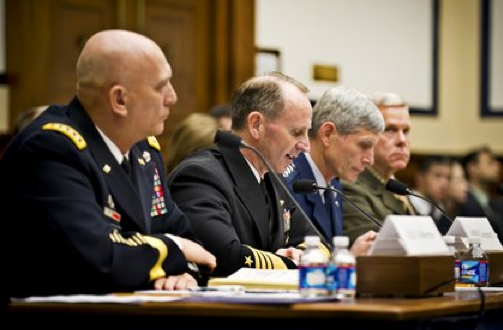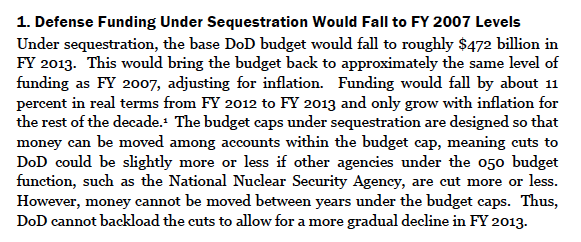
Ray Odierno, Jonathan Greenert and Norton Schwartz, from left, deployed tactical nuclear rhetoric Wednesday on Capitol Hill / Army photo by Teddy Wade
The spectacle now infecting the Pentagon would be humorous, if it weren’t so serious. The notion that the military can cut $450 billion out of its next-decade budget of something like $7 trillion – but not a penny more – suggests an (artillery) shell game’s afoot.
The Joint Select Committee on Deficit Reduction – the so-called “super committee” – apparently isn’t going to come up with the required $1.2 trillion in cuts and tax increases over the coming decade by its Nov. 23 deadline. That will trigger the dreaded “sequestration” of funds, which could double the cuts the Pentagon will have to make: close to $1 trillion out of its proposed spending plan for the next 10 years.
Such cuts, members of the Joint Chiefs told Congress Wednesday, would mean:
Cuts of this magnitude would be catastrophic to the military and — in the case of the Army — would significantly reduce our capability and capacity to assure our partners abroad, respond to crises, and deter our potential adversaries, while threatening the readiness of potentially the All-Volunteer Force.
— General Ray Odierno, Army chief of staff
Sequestration will cause irreversible damage. It’ll hollow the military, and we will be out of balance in manpower, both military and civilian, procurement and modernization.
— Admiral Jonathan Greenert, chief of naval operations
Such a scenario gravely undermines our ability to protect the nation. But beyond the manner in which the potential budget cuts are executed, even the most thoroughly deliberated strategy will not be able to overcome the dire consequences if cuts go far beyond the $450 billion plus in anticipated national security budget reductions over the next 10 years.
— General Norton Schwartz, Air Force chief of staff
Interestingly, the Marine commandant didn’t brandish his rhetorical flamethrower in his opening statement to the House Armed Services Committee. Instead, he said, almost meekly:
As we face the challenging times ahead, the Marine Corps reaffirms its commitment to this — to its traditional culture of frugality. You have my word that the Marine Corps will only ask for what it needs, not for what it might want.
— General James Amos
But the first three proclamations of doom ring a little hollow when you probe the math. Todd Harrison of the Center for Security and Budgetary Assessments has run the numbers once again through his atomic abacus. In a briefing paper issued Wednesday, this was his first conclusion:
The Pentagon would be protected from inflation. War costs would be handled separately. Yet here’s the dangdest thing about that three-hour House hearing where the Joint Chiefs complained about how the nation would be endangered “irreversibly” by sequestration: the year 2007 wasn’t mentioned. Not once. You’d think if folks were interested in a serious debate on how much the Pentagon should spend, someone, somewhere, would ask:
Cutting your budget back to 2007 levels sounds tough, but hardly irreversible. Heck – many of my constituents would be happy to be living on their 2007 income today. Why all the moaning?



